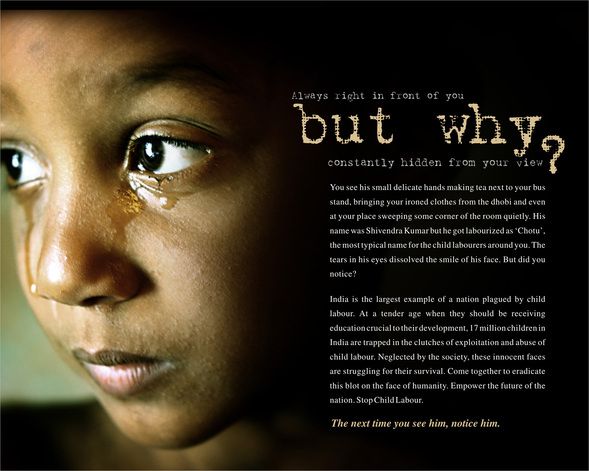How to get custody of a child in colorado
How to File for Child Custody
Filing for child custody means that you petition the Court for specific orders determining parenting time, decision-making and child support, giving you legal and practical rights and responsibilities for the upbringing of the child.
Emotions and tensions tend to run deep when making decisions about the children during a relationship breakup. This often complicates the process of reaching an agreement with the other parent.
As such, it’s vital to understand the process if you want to file for child custody in Colorado so that you can prepare properly. People often refer to “sole custody” but Colorado does not use that terminology. Parenting time is where the child is physically (e.g. regular parenting time, summers, holidays) and decision-making is how major medical, educational, and religious decisions are made for the child (i.e. together or one party acting on his/her own).
Here we take you through a five-step process.
5 steps to file for child custody in ColoradoThe precise steps you take to file for child custody in Colorado may vary depending on your individual circumstances (whether you are married and filing for divorce, unmarried with children, or seeking a change to existing custody arrangements, for instance).
However, the following five basic steps cover most custody situations
1. Determine what Parenting Time and Decision-making Provisions are in your child(ren)’s best interests.
If your relationship is ending, try (if possible) to discuss child custody with the other parent and try to come to an agreement about it. You can petition the court for custody together or separately. Filing the petition is the first step in determining child custody.
In most cases, the Colorado court prefers joint decision-making, where both parents have equal responsibility in making major decisions for the benefit of the child even if the child spends more time with one parent than the other.
However, in some cases, this will not be possible or desirable. Sole custody is where only one parent has decision-making authority, regarding major education, health, religion, and extracurricular activities. Often in the Petition you will need to set forth what you believe is in the child(red)’s best interests and why.
2. File a Petition
You will need to complete each of the following forms to file for custody in Colorado:
- Case Information Sheet (JDF 1000)
- Petition for Allocation of Parental Responsibilities (JDF 1413)
- Summons to Respond to Petition for Allocation of Parental Responsibilities (JDF 1414)
- Order for Allocation of Parental Responsibilities (JDF 1422)
Download these forms here.
To file the forms, you will need to visit the district court in the county where your child currently lives.
The clerk will provide you with a “Case Management Order”, detailing the upcoming court dates and any other forms that you will need.
3. Serve the other parent
If you are filing alone, the other parent must be notified or “served”.
To do this, a process server or sheriff must deliver forms JDF 1413 and JDF 1414 to them and follow the “personal service” process. The court then requires proof that the notice has been served.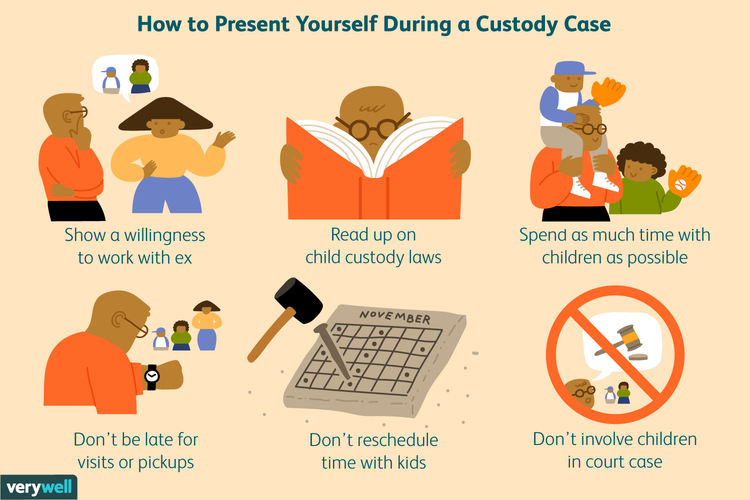
4. Attend the Initial Status Conference (ISC)
Upon filing for child custody, the date for your Initial Status Conference (ISC) should be contained within your Case Management Order.
You must attend this hearing with the other parent and proceedings will be outlined to you from there by the judge, magistrate, or family court facilitator.
5. Prepare and notarize a parenting plan OR attend a hearing
If you reach agreements, the parenting plan is the key document that will assist the court in ordering the custody arrangements for your child(ren). This can occur when parties reach agreements on their own or through mediation. If parties cannot reach agreements, the Court will make the decisions for you and your family at a hearing.
Should you hire legal assistance to file for child custody?Bear in mind that in child custody cases, the judge always has one overriding concern: the best interests of the child(ren).
As such, any petition for custody must be comprehensive and provide strong evidence that the proposed child custody arrangement meets those best interests.
Often, this requires the guidance of an experienced child custody lawyer who is familiar with the family court system in Colorado. That will provide you with the best chance of a positive outcome in your child custody request.
It is possible to file for custody without a lawyer (this is called “pro se” litigation) and this is most common where both parents file together and are in agreement.
However, generally speaking, if you are applying for sole custody or seeking a modification of an existing court order so that you have shared parental responsibilities, this is extremely difficult without legal assistance.
You may need to provide strong evidence of responsibility in past parenting activities or reasons why the other parent should not have equal responsibility.
It can be especially tough to deal with an ex-partner who challenges your petition without the support of an experienced lawyer.
The child custody lawyers at Colorado Legal Group provide a free case evaluation if you are in this position and need guidance.
Return to Blogs
How to File for Custody of a Child in Colorado in 2022
How to File for Custody of a Child in Colorado in 2022January 17, 2022
In cases of child custody, the courts consider many different factors. These may include whether a parent is seeking to change an existing custody agreement, whether they had children outside of marriage, and whether they are currently married and filing for divorce, among mitigating elements.
The Basics of How to File for Child Custody in CO
Although many factors come into play, there are five basic steps that a person must take when filing for custody in the state of Colorado.
- Determine what decision-making provisions and parenting time are in the children’s best interests. In any scenario involving child custody, it is important for the parties involved to discuss the matter and reach an agreement whenever possible. A petition for custody may be filed by one party or by both, and filing this document is the first step.
 Typically, the Colorado court system has a preference for joint decision-making. This means that both parents share responsibility in deciding on major factors that affect the children, even when the children spend more time with one party than the other. In some situations, however, this approach is neither desirable nor possible.
Typically, the Colorado court system has a preference for joint decision-making. This means that both parents share responsibility in deciding on major factors that affect the children, even when the children spend more time with one party than the other. In some situations, however, this approach is neither desirable nor possible.In this scenario, sole custody may be the best option. If this is the case, only one parent has the authority to make decisions regarding extracurricular activities, religion, health, and education. The filing party will likely need to outline in the Petition what they believe is in the children’s best interests and explain why.
- File the Petition. Any individual filing for custody in Colorado will need to complete the following forms:
- Order for Allocation of Parental Responsibilities (JDF 1422)
- Summons to Respond to Petition for Allocation of Parental Responsibilities (JDF 1414)
- Petition for Allocation of Parental Responsibilities (JDF 1413)
- Case Information Sheet (JDF 1000)
The individual must visit the district court in the county where their children live to file these forms.
 The district court clerk will provide the individual with a “Case Management Order” that details any other forms they will need, as well as the upcoming court dates.
The district court clerk will provide the individual with a “Case Management Order” that details any other forms they will need, as well as the upcoming court dates. - Serve the other party. If an individual is filing on their own, the other parent must be served with the court papers. This involves having a sheriff or process server deliver the forms JDF 1414 and JDF 1413 to the other party by following the “personal service” process. Once the forms are served, the court will require proof that this step is complete.
- Attend the ISC (Initial Status Conference). Once the documents are filed for child custody, a date will be set for the Initial Status Conference. This date will be specified in the Case Management Order, and both parents must attend this hearing. During this step, the proceedings for child custody will be outlined in detail by a family court facilitator, magistrate, or judge.
- Prepare a parenting plan and get it notarized or attend a hearing on the matter.
 When both parties are able to reach an agreement, the parenting plan they create will be the primary document that helps the Colorado court in ordering the custody arrangements for their children. It is possible for the parents to reach such an agreement on their own or with the help of a mediator. When the parties are unable to reach an agreement for their parenting plan, the courts will make the necessary decisions for them and their children at a hearing.
When both parties are able to reach an agreement, the parenting plan they create will be the primary document that helps the Colorado court in ordering the custody arrangements for their children. It is possible for the parents to reach such an agreement on their own or with the help of a mediator. When the parties are unable to reach an agreement for their parenting plan, the courts will make the necessary decisions for them and their children at a hearing.
FAQ’s
What Are the 3 Types of Custody?
In Colorado, it is important to understand the correct legal terminology for child custody laws. The state abolished the use of the phrases “physical custody” and “legal custody” in 1999. The term “parental responsibilities” is the proper term today, and it can be broken down into three categories. These three “types of custody” include child support, decision-making, and parenting time.
How Long Does a Child Custody Case Take in Colorado?
As in any legal matter, the specifics of each unique case dictate the length of time the process will take. However, if the custody arrangement is related to a dissolution of marriage, that case must be pending for no less than 91 days before a decree is issued by the court. After this three-month waiting period, the divorce can be finalized, and the child custody agreement can be settled.
However, if the custody arrangement is related to a dissolution of marriage, that case must be pending for no less than 91 days before a decree is issued by the court. After this three-month waiting period, the divorce can be finalized, and the child custody agreement can be settled.
Who Has Custody of a Child If There Is No Court Order in Colorado?
When a couple is unmarried in CO, the father is not given full parenting rights automatically in most cases. Even when the father has been present at the child’s birth and has signed the birth certificate, legal custody of the child is typically bestowed upon the mother.
What Does It Take to Get Full Custody in Colorado?
In many cases, the goal of the courts is to award some type of shared custody to the parents; this is often best for the children. There are, however, common grounds for being awarded full custody in CO. These include the legal incarceration of one parent, proven records of child abandonment, a history of one parent’s substance abuse, physical abuse, or irresponsibility, and a parent terminating their parental rights.
How Much Does It Cost to File for Custody in Colorado?
In Colorado, the process starts by filing a Petition for Allocation of Parental Responsibilities. A parent will need to complete this document when they file for custody, along with paying a filing fee of $222. If an individual has already been granted custody of their children in another state, they must register in CO to be valid. The filing fee for this registration is $166.
The Experienced Professionals at Johnson Law Group Are Here for You
Parents often don’t know where to turn when they are faced with issues regarding the custody of their children. Tensions between the parents may cloud judgment, and the courts may need to step in to determine what is best for the family. Our knowledgeable team can walk you through every step of the process and help you to navigate the complexities of the court system. Reach out to us today to see how we can help you.
CATEGORIES
ARCHIVES
OVERBOARD: HOW TO AVOID SINKING
IN YOUR COLORADO FAMILY LAW CASE
Written by Family Law Attorney Myles S. Johnson
Johnson
Divorce doesn’t have to be dramatic. For the litigants, losing your spouse is significant enough. But you can choose the way it affects your daily life. The only guarantee I can give is that the feeling that you have right now will not be the feeling you end with. This is a season in your life, and it must be approached that way.
GET YOUR FREE COPY TODAY
Our experience, dedication to Colorado families, and our success in each case we represent sets us apart from the competition. We are passionate about family and estate law. Our highly-qualified team will work tirelessly to achieve the best possible results in your case.
COMMERCE CITY
13599 East 104th Avenue
Suite 300
Commerce City, CO 80022
Phone: 720-452-2540
Fax: 720-500-6087
Directions
DENVER
2373 Central Park Blvd.,
Suite 300
Denver, CO 80238
Phone: 720-452-2540
Fax: 720-500-6087
Directions
FORT COLLINS
2580 E Harmony Rd
Suite 201
Fort Collins, CO 80528
Phone: 720-452-2540
Fax: 720-500-6087
Directions
COLORADO SPRINGS
2438 Research Pkwy
Suite 205
Colorado Springs, CO 80920
Phone: 719-624-8712
Fax: 720-500-6087
Directions
CONTACT US
Fast & responsive family law team
- Name*
- Company
- Email*
- Phone*
- City
- State
StateAlabamaAlaskaArizonaArkansasCaliforniaColoradoConnecticutDelawareDistrict of ColumbiaFloridaGeorgiaHawaiiIdahoIllinoisIndianaIowaKansasKentuckyLouisianaMaineMarylandMassachusettsMichiganMinnesotaMississippiMissouriMontanaNebraskaNevadaNew HampshireNew JerseyNew MexicoNew YorkNorth CarolinaNorth DakotaOhioOklahomaOregonPennsylvaniaRhode IslandSouth CarolinaSouth DakotaTennesseeTexasUtahVermontVirginiaWashingtonWest VirginiaWisconsinWyomingArmed Forces AmericasArmed Forces EuropeArmed Forces Pacific
- How did you locate our site?
How did you locate our site?Martindale.
 comLawyers.comGoogleYahooBingPress ReleaseVideoInternet SearchPublicationRecent CaseReferral
comLawyers.comGoogleYahooBingPress ReleaseVideoInternet SearchPublicationRecent CaseReferral - How would you like to be contacted?
How would you like to be contacted?PhoneEmailText
- Reason To Be Contacted
Reason To Be ContactedLooking for Legal RepresentationLooking for a CareerOther
- Message*
- I agree to the terms in the disclaimer.
Attorney Advertising. This website is designed for general information only. The information presented at this site should not be construed to be formal legal advice nor the formation of a lawyer/client relationship.
- Email
This field is for validation purposes and should be left unchanged.
X
Receive your FREE copy!
OVERBOARD: HOW TO AVOID SINKING
IN YOUR COLORADO FAMILY LAW CASE
Johnson Law Group, LLC is located in Denver, CO and serves clients in and around Englewood, Denver, Aurora, Littleton, Wheat Ridge, Adams County, Arapahoe County and Denver County.
Attorney Advertising. This website is designed for general information only. The information presented at this site should not be construed to be formal legal advice nor the formation of a lawyer/client relationship.
Copyright © 2022 All rights reserved.
PAY SECURELY WITH
Retainer Paymentinvoice payment
X
Get your FREE book!
OVERBOARD: HOW TO AVOID SINKING
IN YOUR COLORADO FAMILY LAW CASE
Family Law - Sharifov & Associates - Attorneys at Law
division of joint property in New York
Family law is the branch of law that deals with matters relating to the family and family relations. Our family law practice includes representing clients both at the negotiation stage and in court in cases involving domestic violence (usually followed by an order of protection), divorces, separation, residence of children after divorce, and visitation of children. , child and spousal support, property division, domestic violence, prenuptial agreements, and juvenile delinquency lawsuits. We take part in out-of-court negotiations and also conduct court hearings when necessary.
, child and spousal support, property division, domestic violence, prenuptial agreements, and juvenile delinquency lawsuits. We take part in out-of-court negotiations and also conduct court hearings when necessary.
divorce by consent in New York
Frequently Asked Questions:
1. What is the difference between a contested divorce and a non-contested divorce?
When both husband and wife voluntarily agree on all aspects of divorce, including division of joint property, residence and visitation of children, child support and for former spouses, or are able to sign a separation agreement, their divorce is considered a divorce by consent. Arrest for Domestic Violence in New York On the other hand, when spouses cannot agree among themselves on all aspects of divorce and separation, and require the court to make appropriate decisions on the above aspects of divorce, they are forced to deal with a judicial divorce. On the practical side, a legal divorce requires a lot more work, usually takes longer, and tends to cost more.
order of protection in new york
2. How can I get an order of protection in case family violence?
If something threatens your physical or emotional safety or the safety of your children, you should immediately seek the advice of a lawyer or seek the assistance of the Court. You need to take immediate steps to keep you and your children safe. Family courts in all counties in the State of New York are able to make a quick decision on an application for an order of protection; usually, if needed, it can be done within one day. The Summons, Petition and Order of Protection must be delivered to the defendant. This can be arranged through the local police station, privately, or through a professional document delivery agent. The Family Court may order the Sheriff's Department to serve the documents. The case will be rescheduled and the defendant will be subpoenaed to respond to the domestic violence petition. Either by agreement of the parties or after a hearing, the judge may issue a permanent order of protection, limited or complete, for up to 2 years.
Sometimes the police refuse to make an arrest during an investigation into domestic violence; however, the police may advise the victim to go to Family Court and ask the Judge to issue an Order of Protection. Both the New York State Criminal and Family Courts have concurrent jurisdiction over certain domestic violence offenses. The difference between the procedure in these two courts is that in Family Court, you, as the plaintiff, are a party to the process, and you have control of the lawsuit against the defendant (the person you accuse committed acts of domestic violence against you). violence). at any time you can reach an agreement with the defendant as closed; case, or you can just pick up your petition. If the police refuse to arrest the person you complained about, you can file a petition with Family Court. The Family Court Judge has jurisdiction to issue an Order of Protection (full or limited), which will have the same effect as an Order issued by a Criminal Court Judge. For the past few months, due to the Coronavirus pandemic, Family Court has operated largely virtual, with court hearings via Skype or Microsoft Teams Meetings, and filing petitions via email or Electronic Document Delivery (" EDDS").
For the past few months, due to the Coronavirus pandemic, Family Court has operated largely virtual, with court hearings via Skype or Microsoft Teams Meetings, and filing petitions via email or Electronic Document Delivery (" EDDS").
The Domestic Violence Petition, in the absence of agreement by both parties, will be decided by the Family Court Judge at the conclusion of the hearing on the merits. The New York State Family Court has jurisdiction over other types of petitions, such as Child Visit and Residence, Child Support, Neglect of a Child, Establishment of Paternity, etc.
Sometimes, after an arrest and first appearance in criminal court, a Domestic Violence Petition is also filed in Family Court, requiring the client to attend both courts for both of the relevant cases. If there are minor children in the family, the Criminal Court will often include such children in the Protective Order, however, making an exception for Family Court modifications of the order. In such a case, the defendant who wishes to maintain a relationship with his children must go to Family Court and register a child visitation petition, asking the Judge to schedule visits to the children.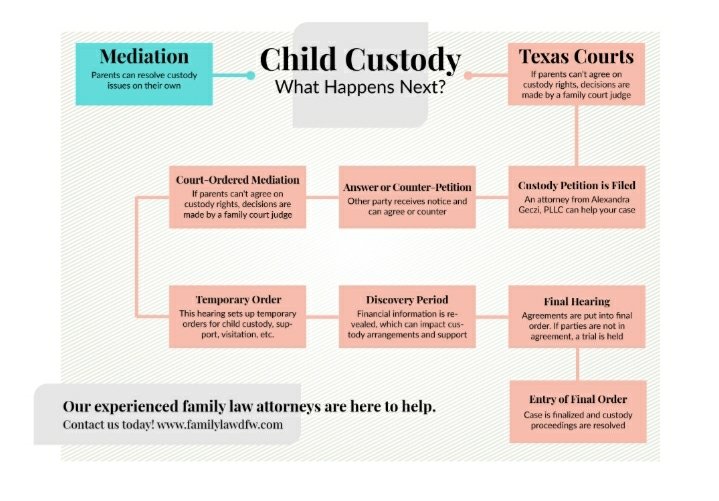 Depending on the circumstances of the original case that led to the Order of Protection, the judge may allow limited visits, supervised visits, or even supervised visits by a welfare agency.
Depending on the circumstances of the original case that led to the Order of Protection, the judge may allow limited visits, supervised visits, or even supervised visits by a welfare agency.
legal guardianship
3. I can't find my spouse, can I file for divorce?
Personal delivery of original divorce papers (Summon Notice or Summons of Complaint) is required by law. However, in the event that the plaintiff (the person initiating the divorce case) cannot find his/her spouse, the plaintiff must obtain court permission for alternative delivery of documents by filing a written petition with the court.
4. When am I officially divorced?
The parties to a divorce proceeding are considered divorced from the moment the judge signs the divorce decree. In the case of a divorce by consent, if a postcard has been filed in advance, the court will notify the final divorce by mail. In the event of a judicial divorce, although the judge may verbally announce during the trial that the parties are divorced, the divorce is officially finalized after the parties' lawyers have submitted the documents to the court and the judge has signed the divorce decree.
5. What is custody and how is the issue of child custody after divorce resolved?
There are two types of custody – legal custody and physical custody. Legal custody essentially means the right to make decisions. During marriage, both parents have rights to raise the child. This includes the right to make decisions about all aspects of a child's upbringing, including religion and education, as long as the parent's decisions do not pose a threat to the child. After a divorce, one of the spouses who has received legal custody of the child makes all decisions independently. You can consult with the other parent, and this is even recommended, however, if you are unable to agree with the other parent or do not wish to consult, you can make your own parenting decisions. Note that the court can always review a parent's decision to raise a child to ensure that the decision is in the best interests of the child. Joint legal custody essentially means that both parents have equal rights to make significant decisions that affect their children's lives. If the parents agreed to joint legal custody, then they essentially agreed to set aside their personal differences in order to effectively raise their children. If the parents are unable to agree on legal custody, then such a decision will be made by the court.
If the parents agreed to joint legal custody, then they essentially agreed to set aside their personal differences in order to effectively raise their children. If the parents are unable to agree on legal custody, then such a decision will be made by the court.
Post-divorce custody means the right of a parent to have a child permanently reside with that parent in the same family and be responsible for their child as long as they live with that parent. If one of the parents received the right to live with the child after the divorce, then the other parent is likely to receive the right to visit the child (visitation). If the parents cannot agree on a visitation schedule for the child, the court will provide such a schedule. Sometimes it is possible to have a joint right of residence of a child with parents in turn in equal shares (joint physical custody). In this case, the child will live half the time in the family of one parent, and half the time in the family of the other.
6.
 Will I have less time to visit my child if the other parent has exclusive legal custody?
Will I have less time to visit my child if the other parent has exclusive legal custody? Optional. Legal custody means the right to make decisions, not the right to spend time with the child. The parent with exclusive legal custody has the right to make most parenting decisions if both parents cannot agree on that decision. If the parents agreed to joint legal custody, then they essentially agreed to set aside their personal differences in order to effectively raise their children. Each parent in this case has equal rights to make decisions regarding the child. Regardless of whether your spouse has exclusive legal custody or both of you, you still have the opportunity to see your child as much as his schedule allows. Visitation of a child is usually independent of legal custody.
7. How is child support calculated?
New York State offers a formula for calculating the amount of child support payable by a parent as specified in Family Code section 240(1-b). This is a rather complicated article of law that must be read and interpreted carefully in order to accurately calculate the amount of child support. Usually, after the allowed deductions from the parent's total earnings, a certain percentage is applied to the balance of earnings to calculate basic child support. The percentage depends on the number of dependent children under 21:
Usually, after the allowed deductions from the parent's total earnings, a certain percentage is applied to the balance of earnings to calculate basic child support. The percentage depends on the number of dependent children under 21:
17% per child, 25% for two children, 29% for three children, 31% for four children, and 35% for five or more children;
It is necessary to carefully and carefully interpret the article of the law in order to accurately calculate child support, as there are many factors and conditions prescribed in the law that affect these calculations.
8. Who pays child support?
Generally, the parent with whom the child does not live most of the time will pay child support to the other parent.
child support in New York
9. Will I be able to pay less child support than is legally allowed?
The best chance to achieve this is to negotiate a reduction in child support as part of a common agreement between the parties. Do not forget, however, that the other party is not obliged to agree to this. Only in rare cases does the court find reasons not to apply the formula provided by law.
Do not forget, however, that the other party is not obliged to agree to this. Only in rare cases does the court find reasons not to apply the formula provided by law.
10. What if the children spend a significant part of their time with me, or even 50% of the time?
Once again, if you are unable to negotiate a reduction in child support with the other party, it will be extremely difficult for you to persuade the court not to apply the statutory formula. To illustrate this, note that even if the parents spend the same amount of time with the children, there is case law stating that the parent with the higher income counts as the parent not living with the child for purposes of calculating child support, and such parent would have to pay formula support! ! This shows how much more beneficial it is for clients to take good faith negotiations seriously as the best way to resolve a dispute.
11. Until what age should a parent support a child?
In New York State, a child is entitled to parental support until the age of 21, unless he/she begins independent living earlier. If a child chooses not to attend college and instead joins the military or starts working full-time, then parental support ends when the child reaches 18 years of age.
If a child chooses not to attend college and instead joins the military or starts working full-time, then parental support ends when the child reaches 18 years of age.
12. Will a child be eligible for support if she stays in college after her 21st birthday to complete her studies and earn a bachelor's or graduate degree?
No. If child support continues after his 21st birthday, it will only be as a result of the agreement of both parents. The law does not require parents to continue supporting children after they turn 21, regardless of whether higher education is completed.
OK with this parent?
The Court takes the issue of changing the residence of children very seriously. The main criterion for the court is the issue of the welfare of the children. In attempting to make such a decision, the court will ask the question: "If such a change in the place of residence of the child is allowed, will it significantly change the nature of the relationship between the child and the parent who does not move to a new place with him?" The court will try to find out as much as possible about the nature of the relationship with the parent. (For example, how often do you see your children? Do you go to their school events? Do you meet with your children during the school week? Do you make use of all the visits that you have assigned to your children? How good are your visits to children?) will evaluate all reasons for the expected relocation of children to determine whether the parent with whom the child lives has explored all possibilities to avoid such a relocation. The distance over which the proposed move is made is also an important factor. Is this the distance that will prevent you from regularly visiting your children? The latest trend in jurisprudence is to generally allow moves up to 2 hours by car from the children's previous residence (assuming the parent with whom the children live generally has a good reason for the move). These decisions were determined by the circumstances, so don't try to reassure yourself ahead of time based on what the court has decided in other cases.
(For example, how often do you see your children? Do you go to their school events? Do you meet with your children during the school week? Do you make use of all the visits that you have assigned to your children? How good are your visits to children?) will evaluate all reasons for the expected relocation of children to determine whether the parent with whom the child lives has explored all possibilities to avoid such a relocation. The distance over which the proposed move is made is also an important factor. Is this the distance that will prevent you from regularly visiting your children? The latest trend in jurisprudence is to generally allow moves up to 2 hours by car from the children's previous residence (assuming the parent with whom the children live generally has a good reason for the move). These decisions were determined by the circumstances, so don't try to reassure yourself ahead of time based on what the court has decided in other cases.
14. Will my spouse be required to pay me alimony or maintenance after the divorce, and if so, for how long?
A recent change to the law that went into effect in 2016 provides for a formula on how to calculate temporary alimony, as well as a recommended formula for calculating permanent alimony after divorce and how long it lasts. There are also additional factors that the court must consider when determining the amount and duration of child support.
There are also additional factors that the court must consider when determining the amount and duration of child support.
Here are a few factors that are considered the most significant:
- length of marriage; the age and state of health of each spouse;
- present and future earning potential for each spouse;
- your opportunity to become financially independent;
- reduced or lost earning opportunity due to denial or delay in education, training, employment, or career development during marriage;
- having children in your home;
This is a complex decision and will be influenced by many factors.
15. Can my spouse evict me from our home?
Unless you have physically, verbally, or mentally abused your spouse, or have already found another place to live, it will be extremely difficult for your spouse to evict you from their home. Unless you agree to move out voluntarily, your spouse will have to file a petition with the court for you to be evicted, and the court will give you an opportunity to respond.
16. Can I and my children continue to live in our house after the divorce?
Assuming that the children will be living with you, and if you have a child under 18, the court will generally try to keep the child in the home, neighborhood, and school to which the child is already accustomed, assuming that the child is fine in that environment, and also implying that financial circumstances allow it.
17. Am I entitled to a share in the value of the house, even if the title is not in my name?
If the house was purchased during the marriage with funds earned during the marriage (regardless of which spouse earned the money), then it is likely that you will be entitled to a share in the price of the house, even if the house is not registered on you. There are many factors to calculate the size, value and percentage of this share.
18. I bought our house before our marriage with funds I bought before our marriage. Will I have to share the cost of my home with my ex/ex-spouse?
Usually not. However, if the house increased in value during the marriage as a result of your spouse's efforts, or as a result of a joint investment in the house, then your spouse may claim a share of the excess price during the marriage. Please note that if you put your spouse's name on the home title deeds, this may cause your spouse to be able to claim a share of the total value of the home.
However, if the house increased in value during the marriage as a result of your spouse's efforts, or as a result of a joint investment in the house, then your spouse may claim a share of the excess price during the marriage. Please note that if you put your spouse's name on the home title deeds, this may cause your spouse to be able to claim a share of the total value of the home.
19. Will the court force me to sell my house?
If there are no children, and assuming the house is jointly owned, the court will allow each spouse to buy out the other spouse's share. If neither spouse has the ability to buy out the other's share, or is not interested in doing so, the court may order the sale of the house and divide the proceeds from the sale at the discretion of the court.
20. Credit cards: Should they be cancelled?
If you think your spouse will use credit cards beyond justified living expenses, consider closing the account. Most accounts can be closed by either paying off the debt or transferring to another credit card. If your name is first on the account, you can achieve the same goal simply by removing your spouse's name from the account. The final liability for debts will be determined by the court or by agreement. In most cases, it is recommended that you inform your spouse of your actions (after the accounts have already been changed) so that he/she is not unpleasantly surprised or embarrassed when the payment is unexpectedly declined.
If your name is first on the account, you can achieve the same goal simply by removing your spouse's name from the account. The final liability for debts will be determined by the court or by agreement. In most cases, it is recommended that you inform your spouse of your actions (after the accounts have already been changed) so that he/she is not unpleasantly surprised or embarrassed when the payment is unexpectedly declined.
21. Do I have to withdraw money from all joint accounts to protect myself from my spouse taking or hiding the money?
The courts do not approve of either spouse withdrawing all the money from a joint account or withdrawing money without good reason. The husband should think seriously before withdrawing money. Do not forget that the court has the right to demand liability from the spouse if it is proved that he squandered or hid the joint funds.
22. If I own a business or share in a business, will my spouse get a share of the business?
If your business was created during your marriage, or you acquired an interest in a business during your marriage, then your spouse will likely be able to claim a portion of that business or a portion of your interest in the business. If you acquired the business before marriage, or you acquired an interest in the business using funds from an inheritance or a gift, then your spouse may claim an excess (if any) of the value of the business that occurred during the marriage if you or your spouse is actively contributed to the value of the business. Usually an accountant is hired to do this calculation and there are many factors that go into this calculation. After the overall valuation of the business is made, it is calculated what percentage of this value should be used to calculate the spouse's share. There are many factors the court will take into account to determine this percentage, including but not limited to the length of the marriage, your spouse's contribution to the business, family earnings or assets invested in the business, etc.
If you acquired the business before marriage, or you acquired an interest in the business using funds from an inheritance or a gift, then your spouse may claim an excess (if any) of the value of the business that occurred during the marriage if you or your spouse is actively contributed to the value of the business. Usually an accountant is hired to do this calculation and there are many factors that go into this calculation. After the overall valuation of the business is made, it is calculated what percentage of this value should be used to calculate the spouse's share. There are many factors the court will take into account to determine this percentage, including but not limited to the length of the marriage, your spouse's contribution to the business, family earnings or assets invested in the business, etc.
23. Can my spouse claim the estimated value of my professional license or higher education diploma?
For divorces initiated before 2016, by law, if all or part of a professional license or higher education occurred during marriage and was paid for by joint family funds, then it is likely that the spouse will be able to claim a portion of the assessed value of such a license or diploma. Following recent changes to the New York State Family Code that went into effect in 2016, the court must no longer consider increased earning potential due to a professional license, college degree, celebrity status, or career advancement as part of a family partnership. assets. However, when deciding on an equitable division of joint marital property, the court must take into account each spouse's direct and indirect contribution to enhancing the earning potential of the other spouse. NY Dom. Rel. L. § 236B(5)(d)(7).
Following recent changes to the New York State Family Code that went into effect in 2016, the court must no longer consider increased earning potential due to a professional license, college degree, celebrity status, or career advancement as part of a family partnership. assets. However, when deciding on an equitable division of joint marital property, the court must take into account each spouse's direct and indirect contribution to enhancing the earning potential of the other spouse. NY Dom. Rel. L. § 236B(5)(d)(7).
24. Which courts can hear divorce, custody and alimony cases?
The Supreme Court has exclusive jurisdiction over divorce cases; however, Family Court has concurrent jurisdiction over custody, visitation, and child support matters. If a person wants to get a divorce, he needs to fill out the original documents in the Supreme Court. If the child's parents are not seeking a divorce, or are not married at all, and want to sue for domestic violence, custody, visitation, or child support, they should file an application in Family Court.
25. What is a juvenile delinquency trial?
This is a New York State Family Court lawsuit involving a juvenile delinquency case between the ages of 7 and 16. When such a minor is arrested in New York State, he/she may obtain a subpoena from the police in Family Court in the county where the alleged offense was committed. On the other hand, when the allegations are serious enough and/or the minor child has had previous police referrals, the child may be detained overnight in a special detention center for children and brought to Family Court the next day when the court is open.
When a child comes to court with a parent or guardian, he/she and the parent will be interviewed by a probation officer and, depending on the charges, previous criminal convictions, the wishes of the victim and their parents, if the victim is a minor, the case may be referred to probation department. In this case, the petition against the juvenile delinquent is not filed and the child agrees to follow the rules of the probation department for an initial period of up to 60 days. The child must attend school, report to the probation department when required, write an essay and/or do community service under the direction of a probation officer, and also have no new drives. If the child complies with all this, the case will be dismissed.
The child must attend school, report to the probation department when required, write an essay and/or do community service under the direction of a probation officer, and also have no new drives. If the child complies with all this, the case will be dismissed.
If a juvenile is charged with a felony, or if the victim wants the case to continue, the New York City Law Department, which in such cases acts as a prosecutor, will file a petition against the juvenile delinquent, and the child will be required to appear before judge. A case on juvenile delinquency is similar to a criminal case of an adult in a criminal court, however, there are significant differences: there is no bail for the release of the defendant to freedom for a minor - either he is left in custody or released without bail on bail to the parent / guardian; no right to a jury trial, instead a court hearing before a judge; no criminal conviction - instead, recognition as a juvenile delinquent; punishment options also vary, including case closure, conditional closure, suspended sentences of up to 2 years, or detention with varying degrees of security for an initial period of up to 18 months.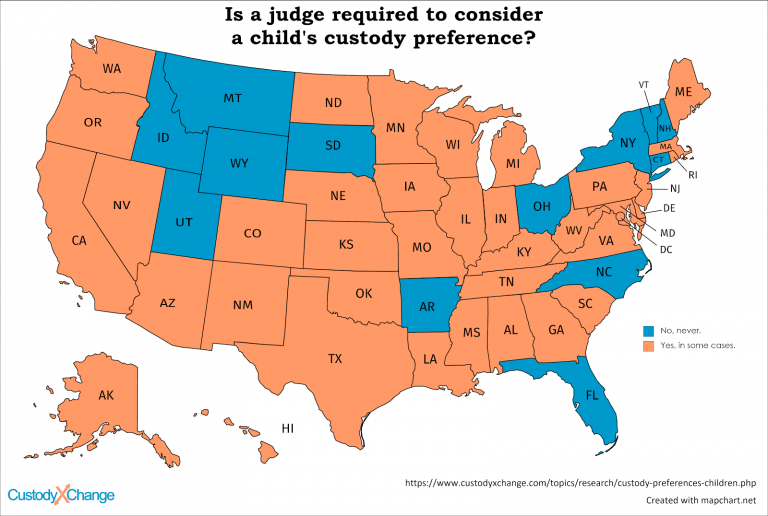 For the most serious crimes allegedly committed by minors 13 years of age or older, the prosecutor has the option to refer the case to an adult criminal court.
For the most serious crimes allegedly committed by minors 13 years of age or older, the prosecutor has the option to refer the case to an adult criminal court.
26. What is marriage annulment and how is it different from divorce?
A man and a woman must be legally capable of entering into a legal marriage. If the parties are not authorized to enter into a marriage, such a marriage can be annulled, that is, declared invalid. Grounds for marriage annulment are untraceable disability, minority, lack of consent, or consent obtained through fraud or intimidation, and incurable mental illness for five years.
- If one of the spouses is terminally incapable of sexual activity, the marriage can be annulled.
- Both parties must be over 18 years of age to marry without parental consent. A marriage between persons under the age of 18 may be annulled, at the discretion of the court, if the spouse under 18 wishes to annul the marriage.
- If, after marriage, either partner becomes terminally ill for 5 years or more, the marriage may be annulled.
 However, a healthy spouse may be required to maintain a mentally ill spouse for life.
However, a healthy spouse may be required to maintain a mentally ill spouse for life. - The parties must knowingly consent to the marriage. A marriage may be declared invalid if either party consented to the marriage as a result of violence or threats from the other party, or if either party did not understand the meaning and consequences of marriage.
- A marriage may be annulled if the consent was obtained by fraud, provided that the fraud was such as to deceive an ordinary reasonable person and was essential to obtain the consent of the other party. Fraud must be at the heart of the marriage contract. Only the injured party can annul the marriage on the grounds of lack of consent.
27. What is a declaration of invalidity of a marriage and how does it differ from annulment?
Unlike an annulment, where a marriage can be declared invalid, some marriages are invalid from the moment they are contracted. Such marriages include incest and bigamy. In the case of incest, this is a marriage between ancestors and descendants, brothers and sisters (including half blood). In the case of bigamy, one of the parties is already married to another person.
In the case of incest, this is a marriage between ancestors and descendants, brothers and sisters (including half blood). In the case of bigamy, one of the parties is already married to another person.
For more information, please contact our company.
tel 516-505-2300
TE L 718-368-2800
Email Sharifovr@lawfirmsr medical college student suspended from work (November 2022) A medical student who abused a child in a hospital was suspended from work (November 2022)
Cultura / Flynn Larsen / Riser / Getty Images
As in all states, Colorado courts use several criteria to determine who gets custody of a child. They fall under the purview of the so-called "best interest of the child" doctrine, a list of factors a judge must consider when taking custody. All states have their own lists of factors, many of which are similar.
Those in Colorado do not discriminate against parents based on gender. This factor is nowhere found in the guidelines of the interests of the state and does not allow for any wrongdoing by either parent that could cause their breakup, provided that the misbehavior does not affect her relationship with the child.
Technically, Colorado law no longer uses the term "guardianship." It's called the "sharing of parenting responsibilities" and the distribution is broken down into two categories: parenting time and decision-making responsibilities. Here is what Colorado considers when determining these rights.
Timing for parenting
The best interests of the child are determined by the following factors in Colorado:
- The wishes of the child, if they are old enough to form a reasonable opinion. This is usually considered to be around the age of at least 12, but this does not mean that the judge will automatically manage how the child wants. This factor is not controlled, but simply taken into account.

- Every parent's wish
- Child's relationships with parents and other influential persons, including extended family members
- Correction of a child in his school, home and community. Courts are generally reluctant to uproot a child who is comfortable and well-adjusted to be moved elsewhere simply because his parents are breaking up.
- Mental and physical health of all parties involved
- Willingness of each parent to maintain a healthy relationship between the child and his other parent
- Level of day-to-day dependency between each parent and child, such as taking him to doctor's appointments, helping him with homework, and attending extracurricular activities with him.
- How close parents live to each other
- Past history of child abuse or neglect. A Colorado court will not grant custody of a parent who poses a physical or emotional danger to a child.
- Past history of spouse abuse or domestic violence between parents.
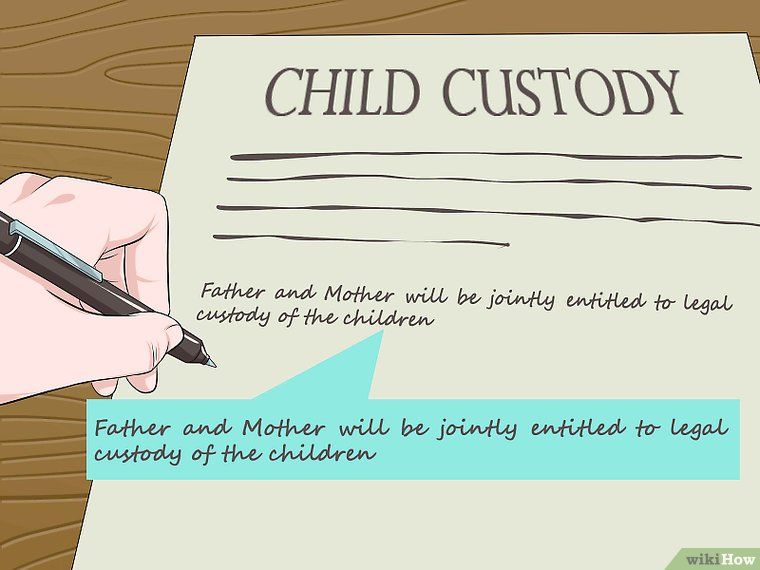 Also, the court will not hold it against a parent if she vacates the family home and temporarily leaves the child to protect herself from abuse.
Also, the court will not hold it against a parent if she vacates the family home and temporarily leaves the child to protect herself from abuse. - The desire of each parent to first put the needs of the child
These factors are primarily related to physical custody, or what Colorado calls parental time, and help the judge determine which parent the child will live with most of the time.
Sharing physical support or parenting times can be difficult for a child when parents live far apart or even just in different school districts. But Colorado courts are increasingly leaning towards having children spend as much physical parenting time with each parent as logistics and proximity allow.
Decision-making obligations
Colorado courts favor joint decision-making obligations regarding parental separation where possible. Every parent has a voice in important decisions regarding the upbringing and well-being of their child.
But this also depends on several factors.





